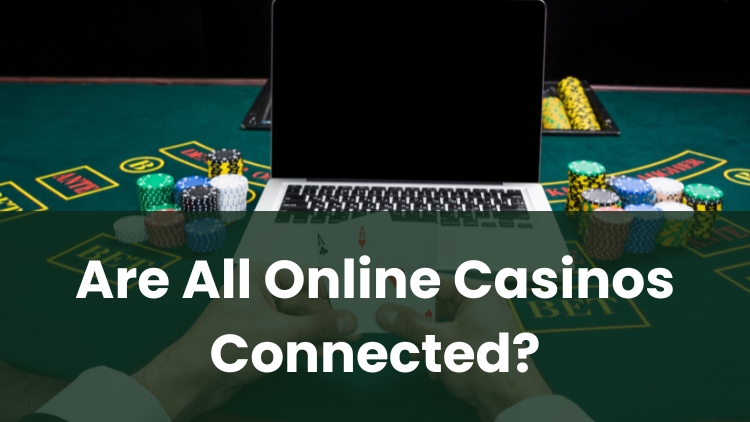
Are you curious as to how online casinos operate behind the scenes? If so, you’re not alone. From experienced gamers to those simply curious in the industry, many wonder whether or not online casinos are all connected in some way.
With the internet offering a vast array of casinos to choose from, understanding how they might - or might not - be linked can seem a little bit puzzling.
Could it be possible that the same company that owns the casino you enjoy also owns other casinos that you’ve never heard of? Could they share the same games, systems, or even customer service teams?
In this blog post, we’re going to discuss the industry of online casinos, and unravel the links that could potentially be behind the scenes.
Do Casinos Share Information?
In the UK, casinos must comply with stringent rules put in place by the UK Gambling Commission (UKGC) to ensure players’ data is handled safely. This means that whilst casinos do store relevant information, such as your email address, they’re highly unlikely to share this information with anyone else unless required by law.
Casinos may share information with other casino sites on the same network/platform (which also means on the same UKGC licence) to prevent fraud or money laundering - this is done securely to keep data safe, ensuring your details are protected. They might also share data to promote responsible gambling, helping players who may need support.
It's good to know that most reputable online casinos have clear privacy policies. These policies outline how they handle and protect your information. You can usually find these on their websites, and they're worth reading to understand your rights.
Do Online Casinos Track You?
If you sign up to play at an online casino, you’ll notice that they require some personal information - for the more sceptical users out there, this might arouse suspicion as to whether or not casinos are tracking your activity.
Simply put, yes, they do track certain details. However, it’s for legitimate reasons. For instance, casinos may track your gameplay to improve their services and personalise your experience. This might mean suggesting games you might enjoy based on your previous choices.
Tracking is also an essential part of how casinos use players’ data; casinos monitor activities to detect any unusual behaviour, which helps in preventing fraud and cheating.
Moreover, they track to promote responsible gambling. This involves identifying players who might show signs of problem gambling and offering support or limiting their activity.
All reputable and licensed online casinos follow data protection laws, which means that they take managing your information responsibly seriously. You can usually find details about how they track and use your data in their privacy policy. Always make sure that you’re playing at legal and regulated sites so you know your information is in safe hands.
Why Do Casino Sites Need Your Address or ID?
When you sign up at an online casino, you might be a little surprised to be asked for your address or ID. Understandably, this might seem somewhat invasive; however, there are important reasons behind these requests.
Verify Age
One of the primary reasons online casinos collect personal information is to verify the age of their players. In the UK, it’s a legal requirement to be at least 18 years old to participate in online gambling.
Online casinos use the age verification process to ensure that all players meet this age requirement. This is crucial to prevent underage gambling and to stay compliant with regulations.
Age verification usually involves checking documents like a passport or driving licence confirming the player’s date of birth. This process helps create a safer gambling environment for everyone.
Confirm Identity
Confirming a player's identity is another important step for online casinos. This process ensures that the person registering is who they claim to be. By confirming identity, casinos can protect players and the platform from fraud. Identity checks usually require players to submit documents like an ID card or a recent utility bill.
These checks help casinos maintain security and fairness, providing an honest gaming experience for all players.
Prevent Fraud
Preventing fraud is a major concern for online casinos. To tackle this, casinos closely monitor activities and transactions, looking out for any suspicious behaviour.
Fraud prevention measures help safeguard both the players and the casinos. By identifying potential threats early, casinos can take action to prevent any fraudulent activity. This protection ensures that everyone can enjoy their gaming experience with peace of mind, knowing that measures are in place to keep them safe.
Are Online Casinos Truly Random?
A key question many players ask is whether online casinos are truly random. This concern is important, as the randomness of games ensures fairness and fun in your gambling experience.
Online casinos use a technology called Random Number Generators (RNGs) to keep games fair. These RNGs are software programs that produce random results, ensuring that each spin of the slot or deal of the card is independent of the last.
For a casino to be licensed, the UK Gambling Commission requires these RNGs to be tested regularly. This means independent organisations check and verify that the games are fair and that the results are truly random.
So, when you spin a wheel or play a hand, you can be confident in the randomness and fairness of the outcome.
It’s always a good idea to play at licensed and regulated casinos to ensure you’re enjoying games that meet these high standards. This way, you can focus on having fun, knowing that the games are as fair as possible. Most importantly, remember to always gamble responsibly and stick to a budget.
**The information provided in this blog is intended for educational purposes and should not be construed as betting advice or a guarantee of success. Always gamble responsibly.
